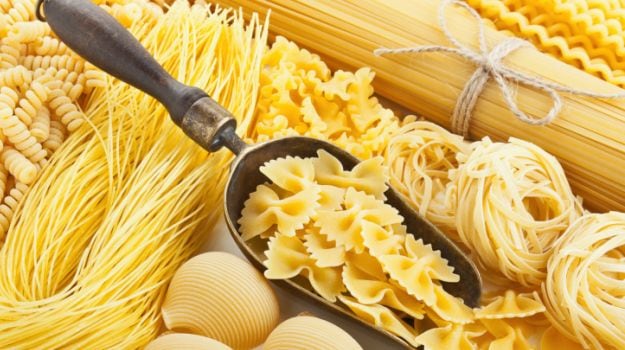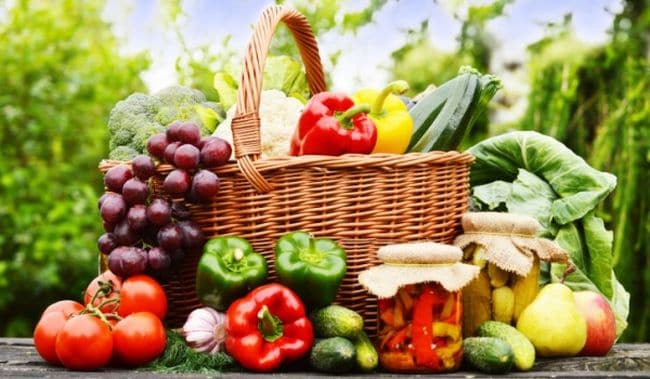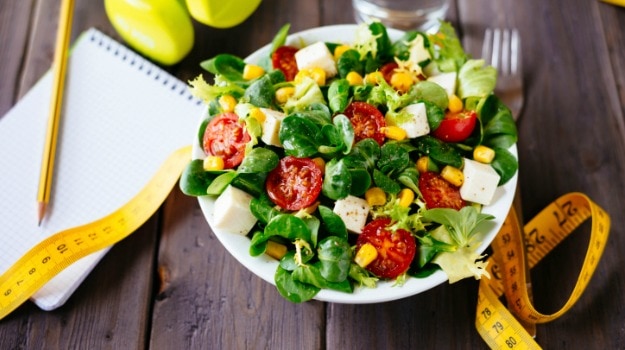I believe there is a diet fad born every few minutes with the number of baseless diet tips floating around. From ‘don’t eat anything post 8 pm’ to ‘grease will make you fat’, we blindly follow whatever new diet tip sounds ‘right’ to us and feel a pang of guilt every time we even lay our eyes on a plate of French fries. It is high time these myths are debunked and the facts are laid out on the table.(Do We Worry Too Much About What We Eat?)Tip #1: Fat is Fattening
Whoever said that the consumption of fat is the reason for your unhealthy lifestyle has definitely been misleading you. To some extent, it does but the facts are a little more complicated than that. It is imperative to understand that there are good fats and bad fats and we need to learn to be able to differentiate between the two.Saturated Fats and trans fats are considered bad for the heart. These include tropical oils (coconut oil, palm oil etc.) fried food, packaged snacks, fatty cuts of meat, high fat dairy products etc. Monounsaturated and polyunsaturated fats are the ones which are beneficial and should be taken in moderation. Examples are tofu, nuts, vegetable oils (olive oil, canola oil etc.), salmon, herrings etc. Bad fat is the real enemy.(Eat right amount of good fat to stay healthy) Tip #2: Blame it on the CarbsWhether it is the Atkins or whichever new diet plan you may have picked up recently, they all discourage the consumption of carbohydrates. The belief is borne out of a misguided fact that carbohydrates cause weight gain. It is said that a high carb diet may result in increased consumption of saturated fats, a leading cause of lifestyle problems. But on the other hands, a low carb diet restricts a balanced healthy food diet and while they may help you reduce weight in the short term, there can be adverse long term consequences. Take a balanced approach to weight loss by consuming a moderate quantity of carbohydrates along with proteins that are plant-based and low in saturated fats. Let’s leave the all-protein diet for the cavemen.(Good Carbs Versus Bad Carbs: Do You Really Need to Worry?)Tip #3: Hell yeah, Cheat Day!The thought of having a cheat day in your diet is extremely exciting and can keep you geared up for your diet. Sure, the thought of having that butter chicken and gulab jamun on Friday night may keep you from eating that extra cookie on Wednesday but not all of us can resist temptation. As much as we plan and apply restrictions on our cheat days, we do tend to indulge in some guilty pleasure to regret it later. The wiser step is to keep a ‘cheat meal’ instead of letting your taste buds take over for an entire day.(Fridays Increase Your Need To Eat)Tip #4: D for Diet, D for Detox.Many avid followers of fad diets also vehemently push for various detox diet plans that make sweeping promises of aiding weight loss. Science rubbishes quite a few of them by pointing out that even as we speak, our kidneys, liver, skin and lungs are carrying out the detox mechanisms for a healthy body. The detox craze has spread like wildfire with detoxifiers for everything from the skin to hair to every internal organ. Truth is, after one of the seven day detox plans you may follow religiously, you might just lose weight, but that would not be because your body has been flushed of all toxins, but because you starved yourself for a whole week.(4 Things You Must Know About a Detox Diet)
Tip #2: Blame it on the CarbsWhether it is the Atkins or whichever new diet plan you may have picked up recently, they all discourage the consumption of carbohydrates. The belief is borne out of a misguided fact that carbohydrates cause weight gain. It is said that a high carb diet may result in increased consumption of saturated fats, a leading cause of lifestyle problems. But on the other hands, a low carb diet restricts a balanced healthy food diet and while they may help you reduce weight in the short term, there can be adverse long term consequences. Take a balanced approach to weight loss by consuming a moderate quantity of carbohydrates along with proteins that are plant-based and low in saturated fats. Let’s leave the all-protein diet for the cavemen.(Good Carbs Versus Bad Carbs: Do You Really Need to Worry?)Tip #3: Hell yeah, Cheat Day!The thought of having a cheat day in your diet is extremely exciting and can keep you geared up for your diet. Sure, the thought of having that butter chicken and gulab jamun on Friday night may keep you from eating that extra cookie on Wednesday but not all of us can resist temptation. As much as we plan and apply restrictions on our cheat days, we do tend to indulge in some guilty pleasure to regret it later. The wiser step is to keep a ‘cheat meal’ instead of letting your taste buds take over for an entire day.(Fridays Increase Your Need To Eat)Tip #4: D for Diet, D for Detox.Many avid followers of fad diets also vehemently push for various detox diet plans that make sweeping promises of aiding weight loss. Science rubbishes quite a few of them by pointing out that even as we speak, our kidneys, liver, skin and lungs are carrying out the detox mechanisms for a healthy body. The detox craze has spread like wildfire with detoxifiers for everything from the skin to hair to every internal organ. Truth is, after one of the seven day detox plans you may follow religiously, you might just lose weight, but that would not be because your body has been flushed of all toxins, but because you starved yourself for a whole week.(4 Things You Must Know About a Detox Diet) Tip #5: The Raw Reality CheckCentred on the beliefs that cooking food destroys the nutrients and enzymes in our food, the raw food diet has got celebrities and a whole lot of people swearing by it. Some of the justifications are, “no other animal cooks food,” and “raw food helps detoxify the body”. While it may be true that cooking does alter the nutritional value for some food products, it does not hold true for all of them. Often raw food consumption leads to ‘negative calories’, which means that the calories gained from the food are less than the calories needed to digest it. This may result in weight loss but can have adverse consequences on the health. No other animal may cook their food, but no other animal can play chess either.(Raw Food Versus Cooked Food: Which is the Key to a Healthy Diet?)
Tip #5: The Raw Reality CheckCentred on the beliefs that cooking food destroys the nutrients and enzymes in our food, the raw food diet has got celebrities and a whole lot of people swearing by it. Some of the justifications are, “no other animal cooks food,” and “raw food helps detoxify the body”. While it may be true that cooking does alter the nutritional value for some food products, it does not hold true for all of them. Often raw food consumption leads to ‘negative calories’, which means that the calories gained from the food are less than the calories needed to digest it. This may result in weight loss but can have adverse consequences on the health. No other animal may cook their food, but no other animal can play chess either.(Raw Food Versus Cooked Food: Which is the Key to a Healthy Diet?)
Whoever said that the consumption of fat is the reason for your unhealthy lifestyle has definitely been misleading you. To some extent, it does but the facts are a little more complicated than that. It is imperative to understand that there are good fats and bad fats and we need to learn to be able to differentiate between the two.Saturated Fats and trans fats are considered bad for the heart. These include tropical oils (coconut oil, palm oil etc.) fried food, packaged snacks, fatty cuts of meat, high fat dairy products etc. Monounsaturated and polyunsaturated fats are the ones which are beneficial and should be taken in moderation. Examples are tofu, nuts, vegetable oils (olive oil, canola oil etc.), salmon, herrings etc. Bad fat is the real enemy.(Eat right amount of good fat to stay healthy)
 Tip #2: Blame it on the CarbsWhether it is the Atkins or whichever new diet plan you may have picked up recently, they all discourage the consumption of carbohydrates. The belief is borne out of a misguided fact that carbohydrates cause weight gain. It is said that a high carb diet may result in increased consumption of saturated fats, a leading cause of lifestyle problems. But on the other hands, a low carb diet restricts a balanced healthy food diet and while they may help you reduce weight in the short term, there can be adverse long term consequences. Take a balanced approach to weight loss by consuming a moderate quantity of carbohydrates along with proteins that are plant-based and low in saturated fats. Let’s leave the all-protein diet for the cavemen.(Good Carbs Versus Bad Carbs: Do You Really Need to Worry?)Tip #3: Hell yeah, Cheat Day!The thought of having a cheat day in your diet is extremely exciting and can keep you geared up for your diet. Sure, the thought of having that butter chicken and gulab jamun on Friday night may keep you from eating that extra cookie on Wednesday but not all of us can resist temptation. As much as we plan and apply restrictions on our cheat days, we do tend to indulge in some guilty pleasure to regret it later. The wiser step is to keep a ‘cheat meal’ instead of letting your taste buds take over for an entire day.(Fridays Increase Your Need To Eat)Tip #4: D for Diet, D for Detox.Many avid followers of fad diets also vehemently push for various detox diet plans that make sweeping promises of aiding weight loss. Science rubbishes quite a few of them by pointing out that even as we speak, our kidneys, liver, skin and lungs are carrying out the detox mechanisms for a healthy body. The detox craze has spread like wildfire with detoxifiers for everything from the skin to hair to every internal organ. Truth is, after one of the seven day detox plans you may follow religiously, you might just lose weight, but that would not be because your body has been flushed of all toxins, but because you starved yourself for a whole week.(4 Things You Must Know About a Detox Diet)
Tip #2: Blame it on the CarbsWhether it is the Atkins or whichever new diet plan you may have picked up recently, they all discourage the consumption of carbohydrates. The belief is borne out of a misguided fact that carbohydrates cause weight gain. It is said that a high carb diet may result in increased consumption of saturated fats, a leading cause of lifestyle problems. But on the other hands, a low carb diet restricts a balanced healthy food diet and while they may help you reduce weight in the short term, there can be adverse long term consequences. Take a balanced approach to weight loss by consuming a moderate quantity of carbohydrates along with proteins that are plant-based and low in saturated fats. Let’s leave the all-protein diet for the cavemen.(Good Carbs Versus Bad Carbs: Do You Really Need to Worry?)Tip #3: Hell yeah, Cheat Day!The thought of having a cheat day in your diet is extremely exciting and can keep you geared up for your diet. Sure, the thought of having that butter chicken and gulab jamun on Friday night may keep you from eating that extra cookie on Wednesday but not all of us can resist temptation. As much as we plan and apply restrictions on our cheat days, we do tend to indulge in some guilty pleasure to regret it later. The wiser step is to keep a ‘cheat meal’ instead of letting your taste buds take over for an entire day.(Fridays Increase Your Need To Eat)Tip #4: D for Diet, D for Detox.Many avid followers of fad diets also vehemently push for various detox diet plans that make sweeping promises of aiding weight loss. Science rubbishes quite a few of them by pointing out that even as we speak, our kidneys, liver, skin and lungs are carrying out the detox mechanisms for a healthy body. The detox craze has spread like wildfire with detoxifiers for everything from the skin to hair to every internal organ. Truth is, after one of the seven day detox plans you may follow religiously, you might just lose weight, but that would not be because your body has been flushed of all toxins, but because you starved yourself for a whole week.(4 Things You Must Know About a Detox Diet) Tip #5: The Raw Reality CheckCentred on the beliefs that cooking food destroys the nutrients and enzymes in our food, the raw food diet has got celebrities and a whole lot of people swearing by it. Some of the justifications are, “no other animal cooks food,” and “raw food helps detoxify the body”. While it may be true that cooking does alter the nutritional value for some food products, it does not hold true for all of them. Often raw food consumption leads to ‘negative calories’, which means that the calories gained from the food are less than the calories needed to digest it. This may result in weight loss but can have adverse consequences on the health. No other animal may cook their food, but no other animal can play chess either.(Raw Food Versus Cooked Food: Which is the Key to a Healthy Diet?)
Tip #5: The Raw Reality CheckCentred on the beliefs that cooking food destroys the nutrients and enzymes in our food, the raw food diet has got celebrities and a whole lot of people swearing by it. Some of the justifications are, “no other animal cooks food,” and “raw food helps detoxify the body”. While it may be true that cooking does alter the nutritional value for some food products, it does not hold true for all of them. Often raw food consumption leads to ‘negative calories’, which means that the calories gained from the food are less than the calories needed to digest it. This may result in weight loss but can have adverse consequences on the health. No other animal may cook their food, but no other animal can play chess either.(Raw Food Versus Cooked Food: Which is the Key to a Healthy Diet?)Advertisement







